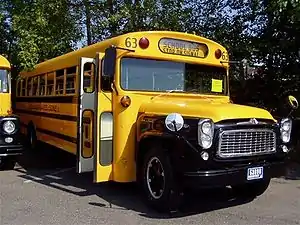I used to be a student
Aim of this lesson: learn how to talk about past states and habits which are no longer true and learn vocabulary related to schools and school subjects.
Dialogue

Read the following dialogue then practice it with a partner if possible. Does John live in Nottingham? Does John play football?
John is meeting Mr. Roberts for a job interview in Manchester.
(listen)
| John | What would you like to know, sir? |
|---|---|
| Mr. Roberts | Could you tell me about your hobbies and what you do in your free time? |
| John | When I was younger I used to play football every week. I even played for my local team. Unfortunately, I don't have time to play any more. When I have the time I usually go to the theatre, play tennis or walk in the countryside. |
| Mr. Roberts | Do you drive? |
| John | I can drive but I don't have a car any more. I don't need one because I always use the bus. |
| Mr. Roberts | Have you always lived in Manchester? |
| John | I didn't use to live in Manchester. I used to live in Nottingham but I moved here to find work. |
| Mr. Roberts | OK thank you John. I will contact you in the next few days. |
Grammar Focus - Used to, No longer, Usually
|
English for B2 students Grammar • Unit 6
| ||||||||||||||||||||||||||||
|---|---|---|---|---|---|---|---|---|---|---|---|---|---|---|---|---|---|---|---|---|---|---|---|---|---|---|---|---|
| Form | Usage | Example | ||||||||||||||||||||||||||
| used to + infinitive (without to) | used to talk about past events which are not true now. | "I used to play football (but now I don't)" = I played football in the past. Now I don't play. | ||||||||||||||||||||||||||
| no longer + infinitive (without to) | used to talk about past events which are not true now. | "I no longer play football" = I played football in the past. Now I don't play. | ||||||||||||||||||||||||||
| usually + infinitive (without to) | used to talk about present situations | "I usually play football" | ||||||||||||||||||||||||||
| ||||||||||||||||||||||||||||
Vocabulary Focus - School
|
English for B2 students Vocabulary • Unit 6
| |
|---|---|
| Word | Definition |
| timetable | document which tells you what time you have lessons |
| canteen | place in a school where students eat lunch |
| home economics | subject where students learn to cook |
| physics | subject where you study forces, gravity and energy |
| maths (math in the USA) | subject where you study numbers |
| schoolmate | another word for your friends at school |
| packed lunch | Lunch for students prepared at home by their mother or father |
| to play truant | informal name for when a student chooses NOT to go to school |
| head teacher (principal in the USA) | the boss or director of the school |
Speaking about School
Try asking and answering these questions in pairs. If you're working alone then write down your answers. Remember that if you're still studying you should answer using the present simple. If you've finished studying then you should answer using the past simple or with used to.
- What is/was your favourite school subject?
- What subjects are/were you good at?
- What subject or sport did you use to be good at?
- Who is/was your favourite and worst school teacher? Why?
- Do/Did you like school? Why?
Exercises
Try these questions to see if you can answer these questions and use this lesson's grammar correctly. The answers can be found here.
Complete the following sentences using used to, usually or no longer:
- Do you play football? I ______ play but now I have no free time.
- Every weekend I meet my friends and we ______ go to the cinema.
- I _____ live in Germany. I love living in Spain.
- What do you ______ do at the weekend?
- I'm sad because I ______ have the time to meet my friends for a drink.
Grammar Reference
For further information about used to and usually see Tenses and Forms.